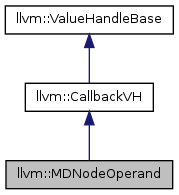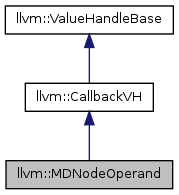

Public Member Functions | |
| MDNodeOperand (Value *V) | |
| virtual | ~MDNodeOperand () |
| void | set (Value *V) |
| void | setAsFirstOperand (unsigned V) |
| void | deleted () override |
| void | allUsesReplacedWith (Value *NV) override |
Detailed Description
Definition at line 55 of file Metadata.cpp.
Constructor & Destructor Documentation
| llvm::MDNodeOperand::MDNodeOperand | ( | Value * | V | ) | [inline] |
Definition at line 68 of file Metadata.cpp.
| MDNodeOperand::~MDNodeOperand | ( | ) | [virtual] |
Definition at line 87 of file Metadata.cpp.
Member Function Documentation
| void MDNodeOperand::allUsesReplacedWith | ( | Value * | ) | [override, virtual] |
Called when this->getValPtr()->replaceAllUsesWith(new_value) is called, _before_ any of the uses have actually been replaced. If WeakVH were implemented as a CallbackVH, it would use this method to call setValPtr(new_value). AssertingVH would do nothing in this method.
Reimplemented from llvm::CallbackVH.
Definition at line 93 of file Metadata.cpp.
| void MDNodeOperand::deleted | ( | ) | [override, virtual] |
Called when this->getValPtr() is destroyed, inside ~Value(), so you may call any non-virtual Value method on getValPtr(), but no subclass methods. If WeakVH were implemented as a CallbackVH, it would use this method to call setValPtr(NULL). AssertingVH would use this method to cause an assertion failure.
All implementations must remove the reference from this object to the Value that's being destroyed.
Reimplemented from llvm::CallbackVH.
Definition at line 89 of file Metadata.cpp.
| void llvm::MDNodeOperand::set | ( | Value * | V | ) | [inline] |
Definition at line 71 of file Metadata.cpp.
| void llvm::MDNodeOperand::setAsFirstOperand | ( | unsigned | V | ) | [inline] |
setAsFirstOperand - Accessor method to mark the operand as the first in the list.
Definition at line 79 of file Metadata.cpp.
The documentation for this class was generated from the following file:
 1.7.6.1
1.7.6.1